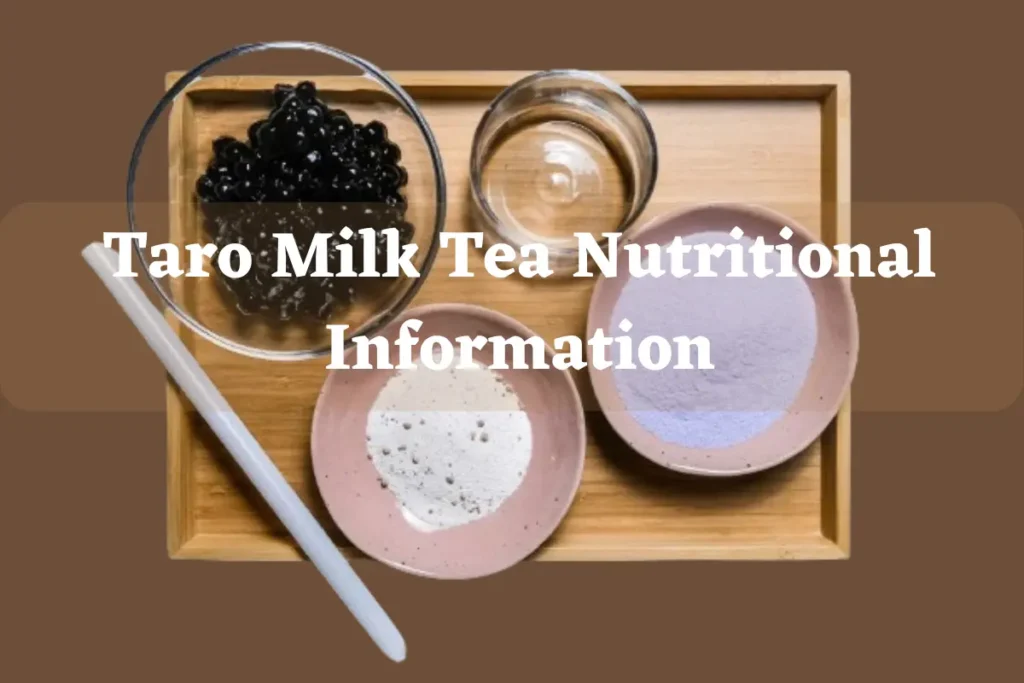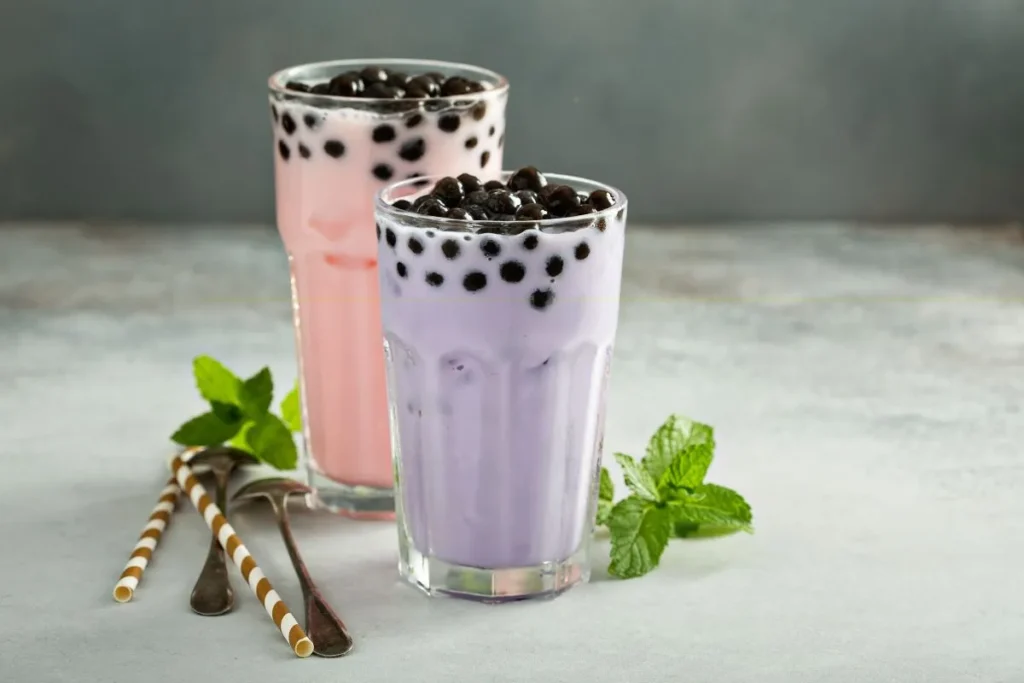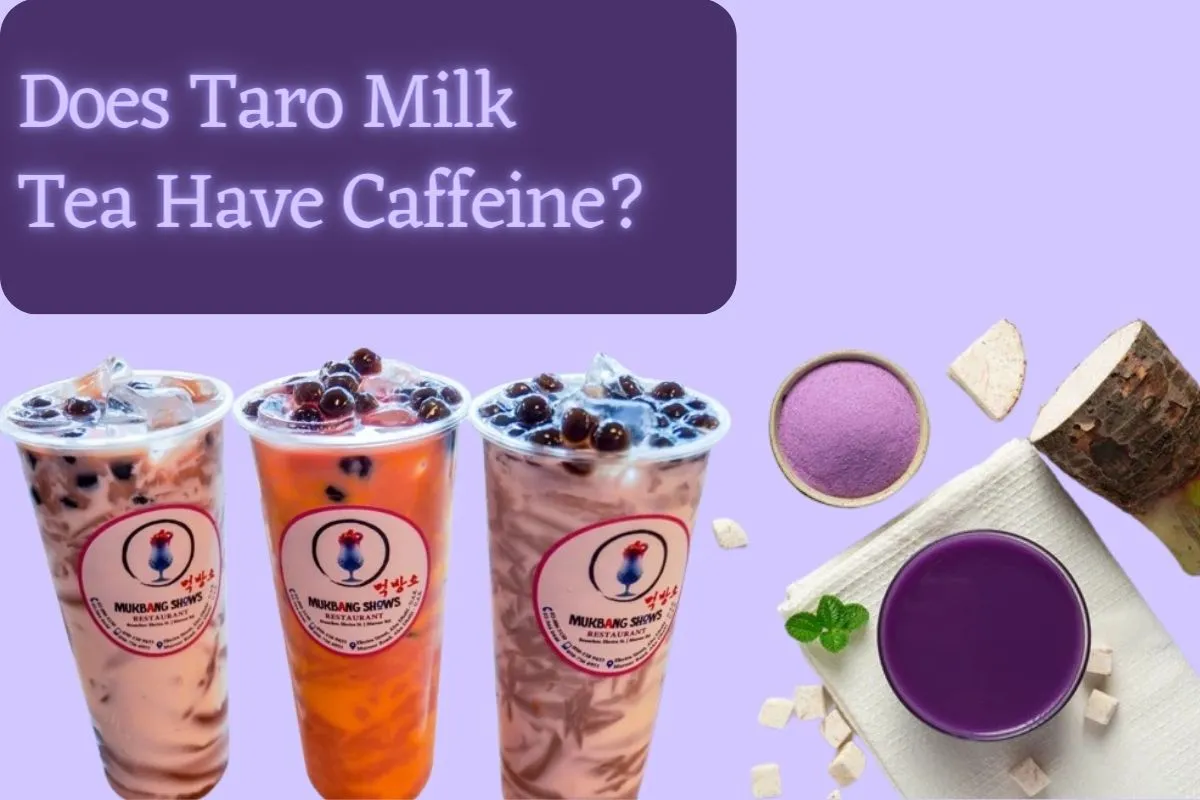Taro milk tea, with its vibrant purple color and sweet, nutty flavor, has captured hearts (and taste buds) worldwide. This Taiwanese creation has become a staple in bubble tea shops and a trendy treat for anyone seeking a unique and satisfying drink. But, as you relax with a taro milk tea in hand, a question might linger: Does Taro Milk Tea Have Caffeine? like so many tea-based beverages?
After all, the taro root itself might be mild, but the addition of tea could change the whole energy equation. Let’s delve into the world of taro milk tea and uncover its caffeine secrets.
Importance of Knowing About Taro Milk Tea
Taro milk tea, a delightful blend of taro root powder, tea, milk, and sweeteners, has captivated taste buds worldwide. Originating from Taiwan, this beverage has spread globally, marking its presence in cafes and bubble tea shops across continents.
Its unique, sweet, and slightly nutty flavor, coupled with its vibrant purple hue, makes it a popular choice among a wide range of consumers.
Beyond its appealing taste and aesthetic, taro milk tea is occasionally touted for potential health benefits, primarily from taro root, which is rich in fiber, vitamins, and minerals. However, it’s crucial to note that the health benefits can be overshadowed by the added sugars and calories in commercial preparations.
The caffeine content in taro milk tea can vary significantly, influenced by several factors. Primarily, the type of tea used (black, green, or oolong) plays a crucial role in determining the caffeine level. For instance, black tea typically contains more caffeine than green tea.
The brewing time and temperature also affect caffeine extraction, with longer brewing at higher temperatures resulting in higher caffeine levels. Additionally, the amount of taro powder and whether it’s mixed with actual tea leaves or tea-flavored powder can alter the caffeine content, as pure taro root does not contain caffeine.
Certain individuals should be cautious about consuming taro milk tea due to its caffeine content. Pregnant and breastfeeding women, individuals with certain medical conditions (such as heart disease or anxiety disorders), and those sensitive to caffeine should moderate their intake.
Caffeine can affect sleep patterns, cause jitteriness, and interact with certain medications. Therefore, understanding the caffeine content in taro milk tea is crucial for these individuals to enjoy the beverage without adverse effects.
Does Taro Milk Tea Have Caffeine?
No, Taro milk tea is not inherently caffeine-free. The caffeine content in taro milk tea primarily depends on the type of tea used as its base—commonly black, green, or oolong tea—all of which contain caffeine.
The taro flavor comes from taro root powder, which itself does not contain caffeine. However, when mixed with tea to create taro milk tea, the final beverage inherits the caffeine content of the tea used in its preparation.
The amount of caffeine in taro milk tea can vary based on several factors, including the specific type of tea leaf used, the quantity of tea in the mix, and how the tea is brewed. Therefore, while the taro component does not contribute to the caffeine content, the tea base does.
For those seeking a caffeine-free option, it’s important to request a version made without traditional tea leaves, potentially opting for caffeine-free herbal teas or a purely milk-based taro drink without any tea added.
Taro Milk Tea Variants and their Caffeine Content
Taro milk tea variants can range widely in their caffeine content based on the type of tea used as the base and how the beverage is prepared.
Black Tea Taro Milk Tea
The classic choice, black tea lends a familiar, robust flavor to taro milk tea. With an average of 35.6 mg of caffeine per 6 fl oz serving, this option delivers a moderate caffeine boost, akin to a weaker cup of coffee. Those who enjoy traditional tea flavors and want an energizing pick-me-up might favor this variant.
Green Tea Taro Milk Tea
Green tea, with its slightly grassy and fresh notes, adds a twist to taro milk tea. It generally contains around 35 mg of caffeine per 8 fl oz serving, providing a milder stimulation compared to black tea options. This variant is a good alternative for those who prefer a gentler caffeine experience with a hint of green tea’s characteristic flavor.
Oolong Tea Taro Milk Tea
Oolong tea offers a wide range of flavors depending on the oxidation level. Taro milk teas made with oolong can vary significantly in caffeine content, ranging from 10 to 60 mg of caffeine per 8 fl oz serving. Lighter oolongs will naturally be at the lower end of the caffeine scale, while darker oolongs offer a more robust caffeine kick. This option is excellent for adventurous tea lovers who want to explore the complexity of both the oolong and the taro flavors.
White Tea Taro Milk Tea
Taro milk tea infused with white tea provides a delicate flavor experience with varying caffeine levels, typically 6 to 55 mg per 250 ml serving. This is a good option for those seeking a less intense caffeine experience from their taro milk tea, with a focus on the sweet, nutty flavor of the taro.
Pu-erh Tea Taro Milk Tea
For a unique and earthy twist, try taro milk tea infused with pu-erh tea. It offers a complex flavor profile along with a substantial caffeine dose, ranging from 30 to 100 mg of caffeine per 240 ml serving. This variant is for seasoned tea drinkers and those who seek a powerful boost of energy.
Herbal Tea Taro Milk Tea
If you’re looking for a caffeine-free option, choose taro milk tea made with herbal teas like chamomile, rooibos, or fruit-based infusions. This variant allows you to enjoy the sweet and comforting flavors of taro milk tea without any worries about caffeine.
List of Ingredients in Taro Milk Tea
The ingredients commonly used in taro milk tea include:
Core Ingredients
- Taro Root: This starchy root vegetable is the heart of taro milk tea. It’s essential to use real taro root, either fresh or frozen, as it gives the drink its signature flavor, delicate sweetness, and beautiful lavender-purple color. Taro powder, while convenient, often lacks the same depth of flavor and vibrant hue.
Tea
- Black Tea: A robust, traditional choice that lends a familiar tea flavor and a moderate dose of caffeine. Look for high-quality loose-leaf black tea for the best flavor experience.
- Green Tea: This option offers a grassy, fresh taste profile and slightly less caffeine than black tea. Jasmine green tea is a particularly popular choice for its subtle floral notes.
- Oolong Tea: Oolong teas provide a wide range of flavors depending on the oxidation level, adding complexity to your taro milk tea. From light and floral to dark and toasty, there’s an oolong to suit most taste preferences.
- Milk: Whole milk, low-fat milk, or plant-based alternatives like almond milk, soy milk, oat milk, or coconut milk all work well in taro milk tea. The choice of milk impacts the overall flavor and creaminess of the drink.
- Sweetener: Sugar is common, but honey, maple syrup, agave nectar, or simple syrup offer unique flavor nuances. Adjust the sweetness level to your liking.
Optional Additions
- Tapioca Pearls (Boba): These chewy, subtly sweet tapioca balls add a delightful textural contrast to taro milk tea. They’re cooked in a simple sugar syrup and typically sink to the bottom of the glass.
- Ice: Enjoy taro milk tea chilled for the most refreshing experience. You can either blend ice into the drink for a smoothie-like consistency or serve it over ice.
Taro Milk Tea Nutritional Information

A typical 8 fl oz serving of taro milk tea contains approximately 97 calories. It offers a small amount of fat at 1.4g (2% of the Daily Value), with 0.5g of saturated fat. Sodium sits at 35mg, and cholesterol is a negligible 2mg. Taro milk tea provides 20g of total carbohydrates, including 18g of added sugars, meaning a substantial portion of its calories come from sugar. While it provides negligible amounts of dietary fiber, it does offer small amounts of calcium (20mg) and potassium (70mg).
| Nutrition Facts | Amount Per Serving |
| Serving Size | 8 fl oz |
| Calories | 97 kcal |
| Total Fat | 1.4g (2% DV) |
| Saturated Fat | 0.5g (3% DV) |
| Trans Fat | 0g |
| Cholesterol | 2mg (1% DV) |
| Sodium | 35mg (2% DV) |
| Total Carbohydrates | 20g (7% DV) |
| Dietary Fiber | 0g (0% DV) |
| SugarsIncludes Added Sugars | 18g (36% DV) |
| Protein | 1g |
| Vitamin D | 0mcg (0% DV) |
| Calcium | 20mg (2% DV) |
| Iron | 0mg (0% DV) |
| Potassium | 70mg (1% DV) |
Alternatives to Taro Milk Tea and their Caffeine Content
When it comes to bubble tea, Taro Milk Tea is a popular choice, but for those looking to explore other options without caffeine, there are several delightful alternatives to consider.
Floral Elegance (Rose and Lavender)
Rose and lavender infused bubble teas offer a classic floral flavor combination that is both creamy and sweet. Lavender provides a delicate sweetness, while roses add a prominent floral taste, creating a luxurious and relaxing tea experience. Both these teas are inherently caffeine-free.
Creamy Delights (Chocolate, Strawberry):
Creamy delights, infused with flavors like chocolate or strawberry, offer a luxurious and satisfying experience without caffeine. These beverages use ingredients like milk, yogurt, or coconut milk, paired with tapioca pearls for a delightful texture.
Fruit-Forward Bliss (Mango, Peppermint):
Fruit-forward bubble teas offer fresh and zesty flavors without the caffeine boost. Options like mango bubble tea or peppermint herbal bubble tea provide a guilt-free indulgence with natural goodness from fruits and herbs.
Matcha Green Tea:
Matcha green tea is a popular choice for boba lovers with its vibrant green color and earthy flavor profile. It contains up to 70 mg of caffeine per cup, providing a moderate caffeine kick compared to coffee.
Fruit Teas:
Fruit teas combine tea with fruit puree or syrup, offering a range of caffeine levels depending on the tea base used. Black tea-based fruit teas contain around 30-40 mg of caffeine per serving.
Chamomile Tea:
Bubble teas using chamomile provide a soothing and caffeine-free option for those looking to enjoy boba without the effects of caffeine. Chamomile tea offers a gentle flavor profile perfect for relaxation.
Ginger Tea:
Ginger tea in bubble tea form offers a spicy and invigorating option that is free from caffeine. Its unique flavor adds warmth and depth to the drink without the stimulating effects of caffeine.
Peppermint Tea:
Peppermint tea brings a refreshing burst of minty flavor to bubble tea without any caffeine content. It provides a cool and revitalizing experience ideal for those seeking a caffeine-free alternative.
| Alternative | Caffeine Content |
| Floral Elegance (Rose and Lavender) | Caffeine-Free |
| Creamy Delights (Chocolate, Strawberry) | Caffeine-Free |
| Fruit-Forward Bliss (Mango, Peppermint) | Caffeine-Free |
| Matcha Green Tea | Up to 70 mg per cup |
| Fruit Teas | 30-40 mg per serving (if black tea-based) |
| Chamomile Tea | Caffeine-Free |
| Ginger Tea | Caffeine-Free |
| Peppermint Tea | Caffeine-Free |
Recommended Daily Intake of Taro Milk Tea

The amount of caffeine in your taro milk tea depends heavily on the type of tea you choose. Most standard-sized taro milk teas offer a moderate dose of caffeine compared to the Recommended Daily Intake (RDI) of 400 mg for healthy adults.
Black and green tea versions generally contain a similar amount of caffeine, providing around 9% of the RDI. Oolong-based taro milk teas have the widest range, with lighter oolongs offering as little as 3% of the RDI, and darker oolongs reaching up to 15%.
White tea variations range between a negligible 1.5% and a substantial 14%. Pu-erh taro milk tea packs the biggest caffeine punch, easily contributing up to 25% of the RDI.
If you’re looking for a caffeine-free option, choose taro milk tea made with herbal infusions. Remember, individual caffeine sensitivity varies, and a larger portion size, even with a less caffeinated tea base, can still impact your intake.
Conclusion
Ultimately, the answer to “Does Taro Milk Tea Have Caffeine?” is a resounding “it depends.” While the taro root itself is caffeine-free, the type of tea traditionally used in the drink heavily influences its caffeine content. For those seeking a caffeine boost, black tea, green tea, oolong, white tea, or pu-erh tea-based taro milk teas offer varying levels of stimulation.
If you’re sensitive to caffeine, want to limit your intake, or simply crave a delicious and comforting treat, then opting for an herbal tea-based taro milk tea is the perfect solution. By understanding the different tea options and their caffeine content, you can make informed choices and enjoy your taro milk tea exactly the way you like it.
FAQs
Q1: What does taro tea taste like?
Taro milk tea has a sweet, nutty flavor with subtle vanilla notes. It’s reminiscent of a milder, slightly earthier sweet potato. The addition of milk adds creaminess, while the type of tea used impacts the overall flavor profile.
Q2: Is taro milk tea healthy for you?
Taro milk tea offers some potential benefits due to the taro root itself, which contains fiber, vitamins, and minerals. However, the addition of sugar and milk (especially full-fat dairy) can increase calories and fat content. Like most treats, taro milk tea is best enjoyed in moderation as part of a balanced diet.
Q3: Why is taro milk tea purple?
The beautiful lavender-purple color of taro milk tea comes naturally from the taro root. The intensity of the purple hue can vary depending on the type of taro used and whether fresh or powdered taro is chosen.
Q4: Is taro milk tea vegan?
Taro milk tea can be vegan! Traditionally it’s made with dairy milk, but plant-based milk options like almond milk, soy milk, oat milk, or coconut milk all work wonderfully. Ensure that any other additions, like tapioca pearls, are also vegan-friendly.

Rossi Glover, the passionate Owner of Grand Lake Coffee, infuses every cup with her love for coffee and dedication to quality. With an extensive background in the art and science of coffee, Rossi is not just a connoisseur but a storyteller, sharing the intricate tales behind each brew.

